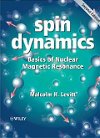Deuterium spin relaxation of fractionally deuterated ribonuclease H using paired 475 and 950Â*MHz NMR spectrometers
Abstract
Deuterium (2H) spin relaxation of 13CH2D methyl groups has been widely applied to investigate picosecond-to-nanosecond conformational dynamics in proteins by solution-state NMR spectroscopy. The
B0 dependence of the 2H spin relaxation rates is represented by a linear relationship between the spectral density function at three discrete frequencies
J(0),
J(
Ï?D) and
J(2
Ï?D). In this study, the linear relation between 2H relaxation rates at
B0 fields separated by a factor of two and the interpolation of rates at intermediate frequencies are combined for a more robust approach for spectral density mapping. The general usefulness of the approach is demonstrated on a fractionally deuterated (55%) and alternate 13C-12C labeled sample of
E. coli RNase H. Deuterium relaxation rate constants (
R1,
R1
Ï?,
RQ,
RAP) were measured for 57 well-resolved 13CH2D moieties in RNase H at 1H frequencies of 475Â*MHz, 500Â*MHz, 900Â*MHz, and 950Â*MHz. The spectral density mapping of the 475/950Â*MHz data combination was performed independently and jointly to validate the expected relationship between data recorded at
B0 fields separated by a factor of two. The final analysis was performed by jointly analyzing 475/950Â*MHz rates with 700Â*MHz rates interpolated from 500/900Â*MHz data to yield six
J(
Ï?D) values for each methyl peak. The
J(
Ï?) profile for each peak was fit to the original (
Ï?M,
Sf2,
Ï?f) or extended model-free function (
Ï?M,
Sf2,
Ss2,
Ï?f,
Ï?s) to obtain optimized dynamic parameters.
Source: Journal of Biomolecular NMR



